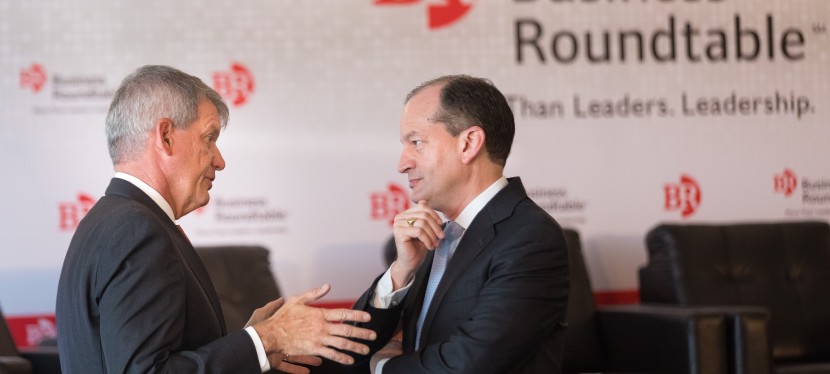By Frank Sherman
There has been a lot of media coverage this week of the Business Roundtable CEOs new commitment and statement on the purpose of corporations. Leaders of companies including JPMorgan Chase, Apple, Amazon and Walmart have abandon their 40+ year sole focus on shareholders to embrace a “fundamental commitment” to all their stakeholders: putting employees, suppliers and communities on a pedestal that once belonged only to shareholders.
Anand Giridharadas, author of Winners Take All: The Elite Charade of Changing the World, has been an effective critic of the statement. “I absolutely see the change. It has become socially unacceptable as a company or a rich person not to be doing good. But what many are failing to do is ask: ‘What have I done that may be drowning out any of the do-gooding I’m doing?’ ” (Fortune, Aug 19, 2019). He cites the 2017 tax bill, supported by the Business Roundtable, in which the lion’s share of the benefits ended up in the hands of the top 1%, increasing the income inequality underlying many social problems.
The ‘enlightened’ CEOs are also taking heat from the right. The Wall Street Journal editorial page was quick to criticize (WSJ, Aug 19, 2019)… “A close reading shows there’s less substance here than meets the media spin, but it’s still notable that the CEOs for America’s biggest companies feel the need to distance themselves from their owners. Yet these CEOs are fooling themselves if they think this new rhetoric will buy off Ms. Warren and the socialist left. It may even embolden them by implying that corporate rules that require a focus on achieving value for shareholders are somehow morally insufficient.”
But Steven Pearlstein, Pulitzer Prize-winning columnist for The Washington Post, professor of public affairs at George Mason University, and author of the book Can American Capitalism Survive? has a different take from the BRT statement. His article in the American Prospect five years ago (When Shareholder Capitalism Came to Town, Apr 19, 2014) partly blamed the BRT for corporate America’s sole focus on shareholder value leading to the corruption of capitalism. However, Pealstein was optimistic about the BRT statement. “It’s important because it signals a shift in attitude in norms. That’s already occurring. It’s sort of confirming something that’s happening that’s, I think, the pendulum swinging back in the right direction, after having swung too far in favor of shareholders.” Pealstein met J.P. Morgan Chase’s CEO and chair of the BRT, Jamie Dimon, in his office last year to discuss the growing public distrust of corporations and CEOs.
When asked by PBS host John Yang if this may just be a P.R. gimmick, Pearlstein gave some practical advice that all stakeholders can benefit. “Yes, it is good for P.R., but if they don’t follow through, if we continue to see companies that say, I’m giving up my American citizenship so that we don’t have to pay U.S. taxes anymore because our shareholders are making us do it; if companies say, we’re going to crush our unions because our shareholders are making us do it; they won’t be able to get away with that anymore.”
It’s up to us to remind these CEOs of their new found conscience!


Corporate America does not have a conscience…. after working in CA for 30 years I have found that the re-occurring theme is CA will not do what is right unless compelled to do so legally or by popular opinion – but only if it will affect the bottom line. dogscorporateblog.com
LikeLike